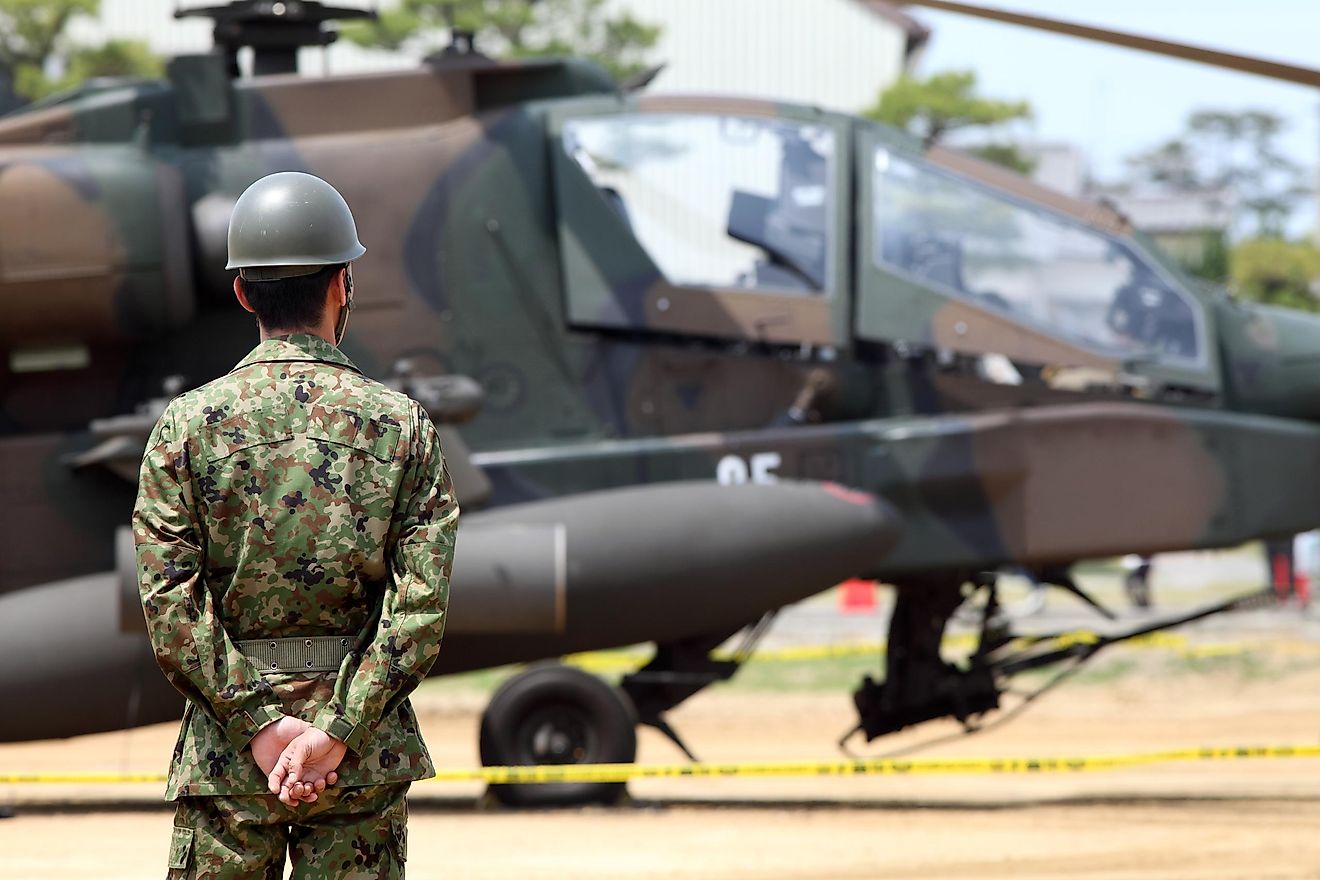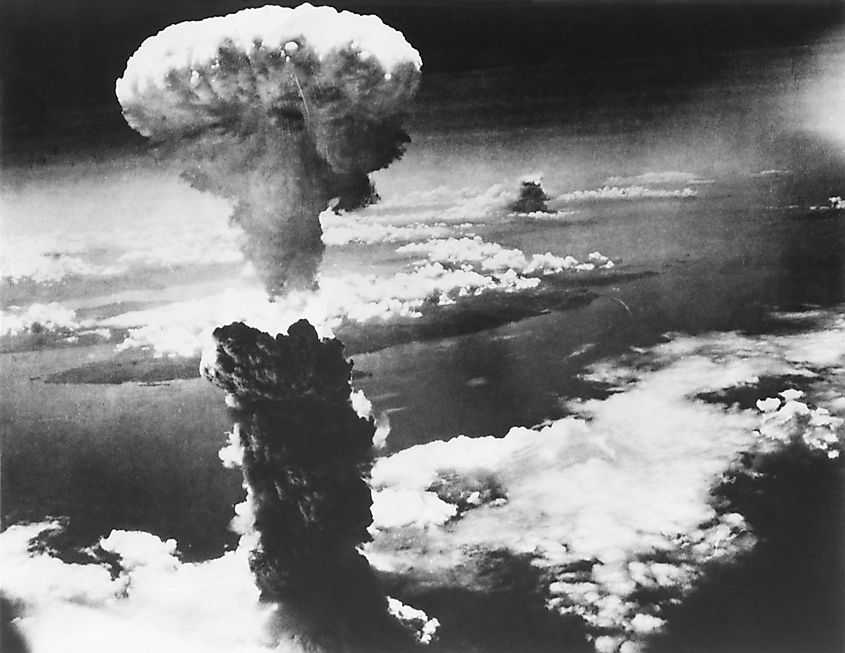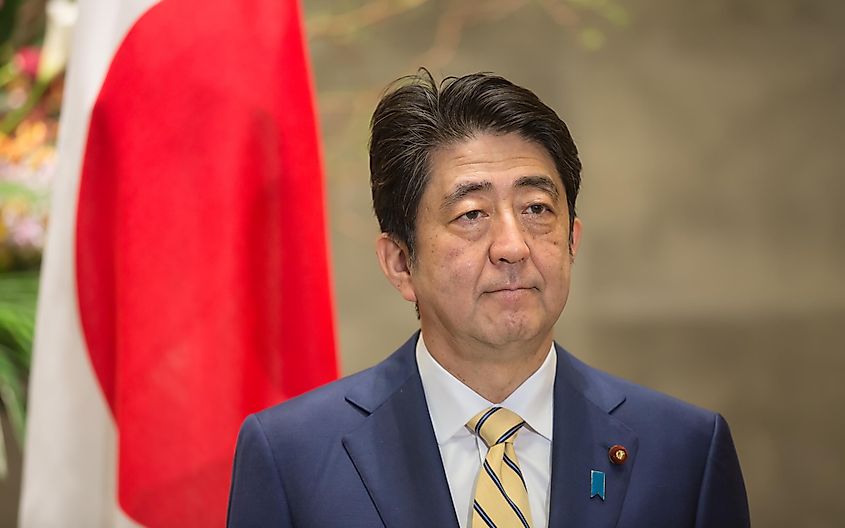Japan Can Have a Military Again
Why Does Nihon Have a Limited Armed services?

- The Japanese Constitution's Article 9 legally prevents Japan from waging war.
- Japanese Self-Defense force Forces serve only to defend and possess no offense-oriented weaponry.
- Nippon depends on the US to protect the nation from greater enemy forces and nuclear attacks.
In the past, Japan's Regal forces managed to defeat Russia in 1905, and at its peak during World War Two it was composed of more than than five million soldiers. Nowadays, Nippon's military, express in size and responsibilities, does not pose a threat toward countries away. Co-ordinate to the International Institute for Strategic Studies, Nihon holds the world'south 6th-best army in terms of funding, despite initially disbanding its military and renouncing war following World War II.
The country stands as a "peaceful rising" postwar model. Nihon supports developing countries and does non serve to intimidate or terrorize them. With Tokyo's autonomous maturity and economic growth, international lodge expects the capital urban center to partake more in international affairs.
Japan's Globe War II Backwash
Nihon'south 1941 Pearl Harbor attack pushed the Usa to participate in World War II in retaliation. The 1946 Constitution of Japan, written by the US later on Nihon was defeated, includes Article nine that legally prohibits Japan from possessing combat potential and waging war. After World War II, the Usa brought Japan nether its nuclear protection because Japan found itself bombed-out and poverty-stricken. Then Japan's old authorities was replaced with a democratic government and its Imperial Army and Navy were dissolved. Although Nippon is not immune to take a military, Japan does invest in Self-Defense Forces (SDF).

Article 9
Article ix of the Constitution of Japan forbids settling international disputes through means of war and bans armed forces maintenance. Article 9 is often referred as the peace clause and details that "country, sea, and air forces, likewise as other war potential, will never be maintained." In wake of the Cold War and the Korean War, notwithstanding, Japan was pressured to reinforce defensive capabilities. A closer inspection of Commodity nine grants Japan the right to defend itself and obtain minimum armed force needed to exercise that right.
SDF
The Self-Defense force Forces of Japan went on to be established in 1954 despite Article ix. Japanese governments argue that the sole purpose of the SDF is defensive and they possess no criminal offence-driven weaponry, such as bombers, long-range ballistic missiles, and aircraft carriers. Though they are well-trained for defensive missions, they are besides modest-sized, under-equipped, and understaffed when it comes to more advanced military operations.
Disaster relief and some UN peacekeeping efforts are part of the SDF'due south few allowable activities. Namely, some disaster relief efforts like the devastating Hanshin earthquake in 1995 and the Fukushima nuclear disaster in 2011 restored civilian faith in the SDF, as the pacifist public viewed the SDF with hostility and suspicion. To achieve their missions, the SDF maintains surveillance and offers communication, command, training support, and logistics while tending to disaster relief. Every bit observed, their main focus concerns preservation of Japanese independence and peace by conducting operations through military like the Ground Self-Defense Forcefulness (GSDF), the Maritime Self-Defence force (MSDF), and the Air Self-Defense force Force (ASDF) to protect Japan from direct and indirect aggression.
If attacked past greater enemy forces, the SDF must have the US coming to their assist. Similarly, if under nuclear threat, the SDF must depend on the The states's nuclear deterrance. Essentially, the SDF's military power is merely defensive and bilateral with the US. Another interesting aspect of the SDF is that they agree no military secrets law, and offenses committed by military personnel are handled past civil courts in appropriate jurisdictions.
To further dissuade any appearance of a militarism revival, Japanese leaders conistently emphasize constitutional guarantees of noncombatant control of the armed forces and authorities.
Prime Minister Abe Discusses Constitutional Amendments
The constitution has never been revised, which frustrates conservative Japanese citizens who experience disgusted over foreigners being responsible for writing their nation'southward basic law. Throughout the years, the constitution has faced numerous proposals for revision, nonetheless the proposals on Commodity ix cannot evade the near heated debates.
Japanese Prime Government minister Shinzo Abe tried to explicitly allow the SDF to arm themselves with offensive weapons. The ballot of Donald Trump inspired fears of Japan and the US's alliance weakening as Trump threatened to withdraw U.s. troops from Nihon. Because of increasing fears surrounding North Korean missile testing and the sarin gas attacks, and aiming to avoid accusations of "freeloading" from the US, Abe's Liberal Democratic Party (LDP) pushed the amendment of Commodity 9 to be a prominent policy result. The LDP and its allies, however, failed to achieve a 2-thirds majority in the Upper House, which ways Abe cannot produce a referendum to revise the constitution. Despite this political outcome, the armed services chapters continues to grow for matters of peacekeeping and post-disharmonize reconstruction operations, and greater missile defense.

Japan's Reiwa Era
In Apr 2019, Emperor Akihito abdicated due to his old age. In plow, the throne has been passed on to his son Prince Naruhito, who invites a new era to brainstorm. In Japan, each emperor would have his own era with its own unique proper noun. For Naruhito, the new era "Reiwa" roughly means "beautiful harmony" and commands order to be restored in the nation. The name "Reiwa" derives from ancient Japanese poetry, non from the usual Chinese literature where the majority of Nippon's era names were found.
The Reiwa era represents a breaking of tradition and even holds a strong bearing on the Japanese Self-Defense Forces. With Prime Minister Abe determined to amend Article 9, he marks the beginning of change closely budgeted, as Japan seeks to lead international security with a military presence shaped by its history.
cabapissompons1998.blogspot.com
Source: https://www.worldatlas.com/articles/why-does-japan-have-a-limited-military.html
0 Response to "Japan Can Have a Military Again"
Post a Comment